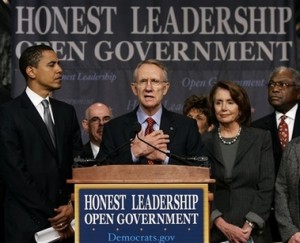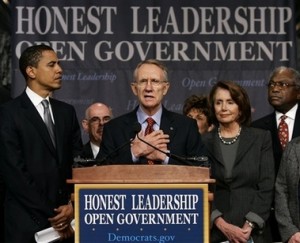
Senator Scott Brown (D-MA), who won a special election in late January 2010 on a platform of opposing Obamacare in the most liberal state in America, has seen his election nullified by Senate Democrats by the midstream switch to reconciliation
By a vote of 56-43, with three Democrats, Sen. Ben Nelson (D-NE), Sen. Blanche Lincoln (D-AR) and Sen. Mark Pryor and Mary Landrieu (D-LA), joined by all 41 Republicans, failing to put the breaks on a large package of changes to the existing law known as Obamacare. Every vote taken on Obamacare in the past few weeks has had the same character: bipartisan opposition failing to stop the remaining majority of Democrats from passing the legislation – hardly what the average American would expect on the signature legislation of President Obama, as the media-created Obama Brand is one of a “bipartisan” “pragmatic” “centrist” leader. Indeed, the only thing bipartisan about the legislation is the opposition to it from centrist Democrats and the entire Republican Party.
Obama and the Democrats had tried to avoid making any changes to the House reconciliation package, but the Senate Parliamentarian ruled some parts of it out of order under reconciliation rules, forcing the Senate Democrats to make some changes and sending the entire reconciliation Obamacare package back to the House for a final, final vote tonight. The Dems and GOP House members are going back and forth with short speeches in the House now.
It looks like the House will vote shortly to bring the Obamacare legislating to a close:
The Senate approved a package of fixes to the health care reform law Thursday, drawing to a close the chamber’s year-long effort to overhaul the nation’s insurance system.
But the work isn’t done quite yet.
The bill passed 56 to 43, with Vice President Joe Biden presiding over the chamber. Senate Republicans forced a pair of changes to the reconciliation bill overnight, sending it back to the House for a final vote later Thursday.
Democrats believe the minor changes – to language regarding Pell Grants for low-income students – won’t derail House passage, meaning that Democrats are set to finally conclude the legislative struggle needed to make health reform a reality.
As you can see from the prose above from Politico,the establishment media is in a state of near orgasm over the imminent final passage of the Obamacare package, as the average left wing journalist is overjoyed to “finally conclude the legislative struggle needed to make health reform a reality.” That is actually fairly tame compared to the NYT, who declares just now that
The NYT, in a moment of candor, admits that the procedural trickery engaged in by Senate Democrats was successful in avoiding the will of the American people as embodied by the election of Senator Scott Brown (D-MA) in January 2010 on a platform of explicit opposition to Obamacare and a promise to be the “41st vote” to stop Obamacare in the Senate.
The Senate action appeared to be the penultimate step in a series of intricate legislation maneuvers that Democrats were forced to undertake after a Republican, Scott Brown, won a special Senate election in Massachusetts on Jan. 19, stripping Senate Democrats of the 60th vote that they needed to surmount Republican filibusters.
In a sane world, the “paper of record” in the United States would be troubled by Congress’s manipulation of its procedural rules to avoid the electoral will of the American people, but alas, the NYT has no such concerns, as in the very next paragraph the Times slips into its well-worn role as fawning Obama cheerleader, praising him for engineering the entire process of “intricate legislative maneuvers that the Democrats were forced to take” to subvert the will of the American people as expressed by the election of Scott Brown:
Many Democrats credited the president with having saved the legislation from the brink of collapse. He held a remarkable, day-long televised forum with Congressional leaders of both parties, lobbied for the overhaul in campaign-style rallies around the country, attacked abuses by private insurance companies, and repeatedly told the stories of everyday Americans who had suffered in the existing health system.
The Times appears to be a cheap date regarding the lavish praise it tosses out above for Obama, as everything they list as Obama’s “remarkable” actions are just standard, scripted political events that require little by way of unique or “unprecedented” skill sets to accomplish. It is odd for the “paper of record” to so explicitly celebrate the use of “intricate legislative maneuvers” and staged, scripted political events by DC officials to avoid the logical result of recent election results.
Indeed, the fact that the Democrats did indeed manage to make history by switching, midstream, from a bill passed via regular order to a reconciliation bill, would have merited a mention from the “paper of record”. However, the NYT fails to note this “unprecedented” legislative trickery by Obama and the Demcrats, but it was noted by ardently ideological leftist Lawrence O’Donnell. The entire uncut O’Donnell appearance on Morning Joe on March 12, 2010 can be seen here. O’Donnell notes the “unprecedented” nature of the Democrats’ plan to switch gears after Scott Brown’s Senate victory and pursue reconciliation to pass Obamacare:
JOE SCARBOROUGH: Will Democrats get health care passed?
LAWRENCE O’DONNELL: I’m going to say what I’ve said all along in my humble approach to this subject. I, having worked on this kind of legislation on the Senate floor, trying to get it passed, and in committee. I do not see how they can do this. Now, and part of that is because it’s never been done before. And they have moved into a legislative territory that has never previously existed. The Republicans have not been very smart about trying to describe this. It’s difficult to describe. But this is unprecedented, using reconciliation this way. Because what they’ve done, is that they’ve abandoned a bill in mid-conference. The Senate passed a bill, the House passed a bill. They were in mid-conference negotiating this bill, in conference, and they said it’s going to be impossible for us to pass it now because of Scott Brown, so we’re going to abandon conferencing this bill and move over to another legislative vehicle, called reconciliation. To handle something you’ve already been legislating another way, now, that’s never occurred before.
SCARBOROUGH: That’s never happened?
O’DONNELL: Never, never, never.
When the history books are written about the passage of Obamacare, perhaps this unprecedented legislative trickery, now completed, by Democrats to accomplish a nullification of the election of Scott Brown (R-MA) will garner more attention. For now, the establishment media is sure to continue in near orgasm mode, with lavish praise for media hero Obama and his merry band of Democrats.







